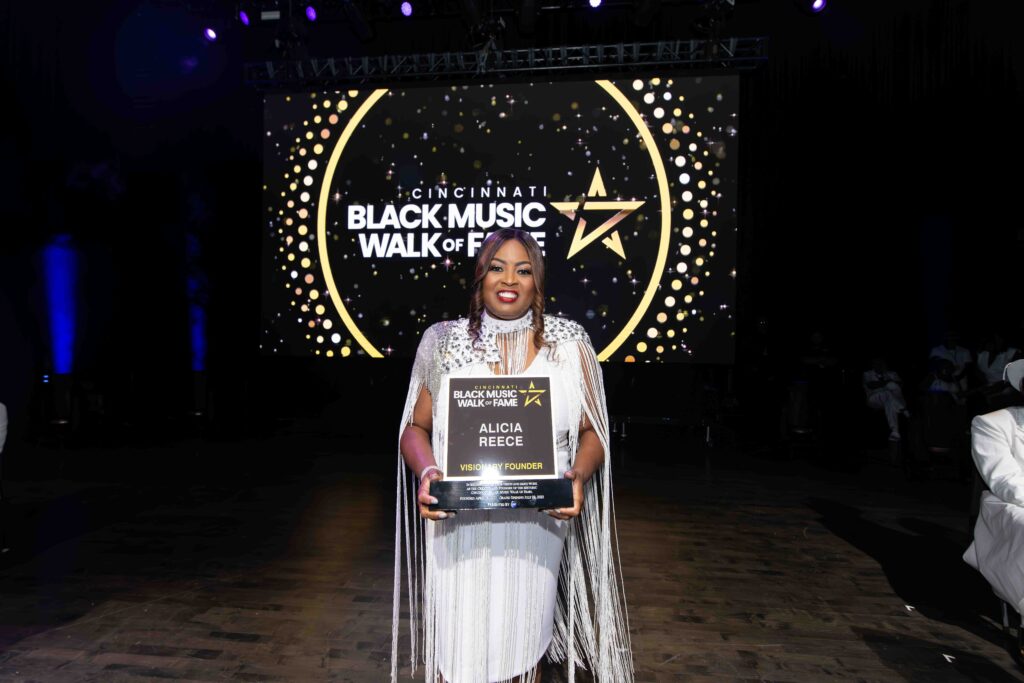The Cincinnati Music Festival pulls in the most tourists the Midwest city sees annually. 2023 marked the festival’s 55th year and saw an influx of over 90,000 tourists visiting the town, with an economic boost totaling over $107 million.
The three-day festival featured musical performances from some of the industry’s most prominent names. An homage to the 50th anniversary of hip-hop, featuring Big Daddy Kane, Rakim, Doug E. Fresh and Slick Rick, kicked off the weekend. Jill Scott, Al Green, Babyface and Snoop Dogg took over Paycor Stadium the following nights. A surprise appearance by Cincinnati resident Dave Chappelle made the final night even more exciting.
One of the weekend’s highlights was the opening of The Cincinnati Black Music Walk of Fame. The interactive museum was erected to celebrate the influence that the city’s native sons and daughters have had on the music industry for decades.
The Walk of Fame is the brainchild of Hamilton County Commissioner Alicia Reece. Reece introduced the idea in 2021.
“Some of these Black artists were not allowed to perform in fancy facilities or stadiums,” Reece said in an interview with Blavity. Reece also revealed that some of the honored artists “had to sing with their backs turned to the audience” and deal with never “receiving the credit or monetary success” from what they contributed to the entertainment industry.
The passion project soon turned into a year-and-a-half undertaking that has forever cemented the city in music history.

Music is embedded in Cincinnati’s history
The Walk of Fame sits on 198 acres of Cincinnati’s downtown area, known as ‘The Banks’. With the Ohio River as its backdrop, the historic land once served as home for people who escaped slavery and came to the city seeking freedom. A short distance from the Walk of Fame is the National Underground Railroad Freedom Center.
“This land is sacred,” Reece said. “Our ancestors created music that kept them strong here. These stories can’t die.”
The attraction welcomes guests by offering several exhibits showcasing talented individuals and groups from Cincinnati and its neighboring cities.
Digital aids share facts that connect yesterday’s history with today’s music. Podiums tell the stories of historical figures such as Louise Shropshire, whose song “If My Jesus Wills” became the groundwork for the hymn of the Civil Rights movement, “We Shall Overcome.” Another podium provides the timeline of L.A. Reid transitioning from a musician with The Deele to a co-founder of LaFace Records.
Dotted along the walkway leading into the museum are stars paying homage to inductees. The Cincinnati Black Music Walk of Fame is designed to house 200 stars, with four being inducted yearly.
“It’s like a once-in-a-lifetime dream,” Bootsy Collins told Blavity. The iconic bass guitarist and singer-songwriter was honored with an inaugural star in 2021 and attended the live grand opening this summer. “It’s my hometown, and to get an honor, that doesn’t happen too much. Especially for us here in Cincinnati,” he said.

Toledo, Ohio, native Shirley Murdock was also there to receive her flowers. She expressed her excitement about the Walk of Fame being a place where generations can come to appreciate the music and history that originated in the city. “To not let the music die and say ‘you matter and you made an impact’ is so important,” she told Blavity.
She added that the Walk of Fame’s significance for young artists and others in the Black music community is “mind-blowing.”
James Brown was among the inductees honored at the grand opening, along with Cincinnati music legend Philippé Wynne, who was the lead vocalist for The Spinners.
The impact the monument has on the Black community goes far beyond music. It is a testament to the city’s focus on Black-owned businesses.
“Hamilton County Commissioners is doing more than ever before to provide financial support and entrepreneurial resources to small businesses,” Reece said.

The county recently launched its first-ever Office of Small Business in partnership with the Urban League and African American Chamber. Equity and economic advancement of women-led, minority-owned businesses are the primary recipients of this assistance.
Small business funds have granted a total of more than $14 million in federal relief to over 1,400 small business owners, The Cincinnati Herald reported.
Reece said she is committed to keeping the Cincinnati Black Music Walk of Fame free for the community.
